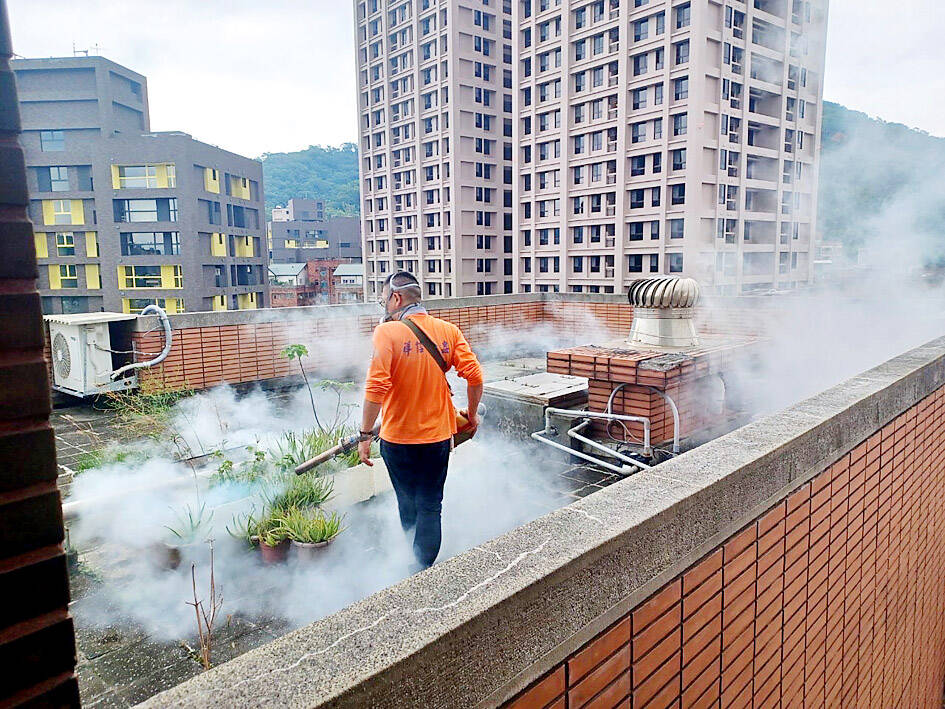The second instance of vertical transmission of dengue fever this year was reported and the death of the youngest person due to flu this season was confirmed last week, the Centers for Disease Control (CDC) said yesterday, adding that 1,521 local dengue cases and 90,386 hospital visits for flu-like illness were reported last week.
There were 1,521 local dengue cases last week, with Tainan having 1,283, Kaohsiung 119, and 14 other administrative regions reporting one to 32, CDC Epidemic Intelligence Center Director Guo Hung-wei (郭宏偉) said.
The number of weekly new cases has dropped slightly, but the risk of infection is still high, Guo said.

Photo courtesy of the New Taipei City Department of Health
Cases so far this year are the second-highest for the period in a decade, he said, adding that nine severe dengue cases and seven deaths were confirmed last week.
CDC physician Lin Yung-ching (林詠青) said that a case of mother-to-infant transmission of dengue was confirmed last week, affecting a five-day-old boy, the second such case this year and the third ever in Taiwan.
The mother was diagnosed with dengue one day after giving birth on Wednesday last week, and the child developed a fever five days later and tested positive for dengue, Lin said.
As the baby had been in hospital since he was born and had a short incubation period, the disease was most likely transmitted vertically, he said.
Meanwhile, 90,386 hospital visits for flu-like illness were reported last week, slightly fewer than the previous week, potentially affected by fewer people seeking medical attention over the long weekend, Guo said.
The most common viruses identified from respiratory illnesses in the past four weeks were flu viruses, predominantly influenza A strains H1N1 and H3N2, he said, adding that 40 severe cases and eight flu-related deaths were confirmed last week.
One of the people who died was an 11-month-old boy, the youngest flu death this flu season, Lin said, adding that the child had congenital heart disease and had a fever for five days, followed by rashes — diagnosed as roseola infantum — after the fever abated.
However, he developed a fever again for two to three days, and was rushed to hospital with decreased vitality and loss of appetite, Lin said.
He had a high fever, shortness of breath, cyanosis and low blood pressure, and tested positive for flu, and was admitted to an intensive care unit, Lin said.
Test results showed that the boy also had myocarditis and pneumonia, he said.
He died the day he was hospitalized, Lin added.
The CDC suggests that children get vaccinated when they are older than six months, especially if they have underlying health conditions, as they are at higher risk of developing severe complications, Lin added.
There were 10,920 hospital visits for enterovirus infection last week, about 14.8 percent fewer that the previous week, CDC Deputy Director-General Tseng Shu-hui (曾淑慧) said.
Although the number might have been affected by the long weekend, it was still above the epidemic threshold, so people with young children should remain vigilant for early signs of severe complications, she said.

ANOTHER EMERGES: The CWA yesterday said this year’s fourth storm of the typhoon season had formed in the South China Sea, but was not expected to affect Taiwan Tropical Storm Gaemi has intensified slightly as it heads toward Taiwan, where it is expected to affect the country in the coming days, the Central Weather Administration (CWA) said yesterday. As of 8am yesterday, the 120km-radius storm was 800km southeast of Oluanpi (鵝鑾鼻), Taiwan’s southernmost tip, moving at 9kph northwest, the agency said. A sea warning for Gaemi could be issued tonight at the earliest, it said, adding that the storm is projected to be closest to Taiwan on Wednesday or Thursday. Gaemi’s potential effect on Taiwan remains unclear, as that would depend on its direction, radius and intensity, forecasters said. Former Weather Forecast

As COVID-19 cases in Japan have been increasing for 10 consecutive weeks, people should get vaccinated before visiting the nation, the Centers for Disease Control (CDC) said. The centers reported 773 hospitalizations and 124 deaths related to COVID-19 in Taiwan last week. CDC Epidemic Intelligence Center Director Guo Hung-wei (郭宏偉) on Tuesday said the number of weekly COVID-19 cases reported in Japan has been increasing since mid-May and surpassed 55,000 cases from July 8 to July 14. The average number of COVID-19 patients at Japan’s healthcare facilities that week was also 1.39 times that of the week before and KP.3 is the dominant

The Chinese Communist Party’s (CCP) working group for Taiwan-related policies is likely to be upgraded to a committee-level body, a report commissioned by the Mainland Affairs Council (MAC) said. As Chinese President Xi Jinping (習近平) is increasingly likely to upgrade the CCP’s Central Leading Group for Taiwan Affairs, Taiwanese authorities should prepare by researching Xi and the CCP, the report said. At the third plenary session of the 20th Central Committee of the CCP, which ended on Thursday last week, the party set a target of 2029 for the completion of some tasks, meaning that Xi is likely preparing to

US-CHINA TRADE DISPUTE: Despite Beijing’s offer of preferential treatment, the lure of China has dimmed as Taiwanese and international investors move out Japan and the US have become the favored destinations for Taiwanese graduates as China’s attraction has waned over the years, the Ministry of Labor said. According to the ministry’s latest income and employment advisory published this month, 3,215 Taiwanese university graduates from the class of 2020 went to Japan, surpassing for the first time the 2,881 graduates who went to China. A total of 2,300 graduates from the class of 2021 went to the US, compared with the 2,262 who went to China, the document showed. The trend continued for the class of 2023, of whom 1,460 went to Japan, 1,334 went to